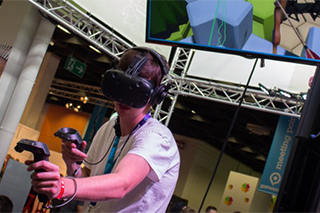Virtual reality applications are generally considered to have enormous economic potential. In fact, virtual reality (VR) is already a reality in many areas, but it is especially obvious in the case of the gaming industry how VR can unleash its potential in this regard. WiSo Prof. Reinhard Kunz from the Institute for Media and Technology Management at the WiSo Faculty and Prof. Christian Zabel (TH Köln) took a closer look at the customers. "Is virtual reality only something for teenagers? Absolutely not!", they found out in their joint study.
For the scientific study, Reinhard Kunz and Christian Zabel interviewed about 4500 German VR game users. The descriptive evaluation carried out so far shows: Only one in five said they were under 25 years old, while about 30 % were over 40. On average, the respondents were a respectable 36 years old. Around two thirds of all participants used VR "several times a month". 36.7% of the respondents even played in virtual spaces several times a week. The most important motives for use were entertainment, fun and "because the games are exciting". Pastime, social exchange and competition with other players were also frequently mentioned reasons.
According to Reinhard Kunz and Christian Zabel, the fact that the average age of the users was a relatively high 36 years, compared to the usual values in the gaming sector, may be related to the higher purchasing power of this age segment. This is also supported by the fact that about 60 % of the users are employed. In addition, the vast majority of all respondents own a VR device (71.3%).
The survey thus indicates that VR gaming is a new market for the industry that can tap into an older clientele with increased purchasing power. Only time will tell what economic benefit this emerging market will have.
The complete results and the presentation of the first descriptive evaluation are available on request from Prof. Dr. Reinhard Kunz (Media and Technology Management at the University of Cologne) and Prof. Dr. Christian Zabel (Institute of Economics at the TH Köln).
